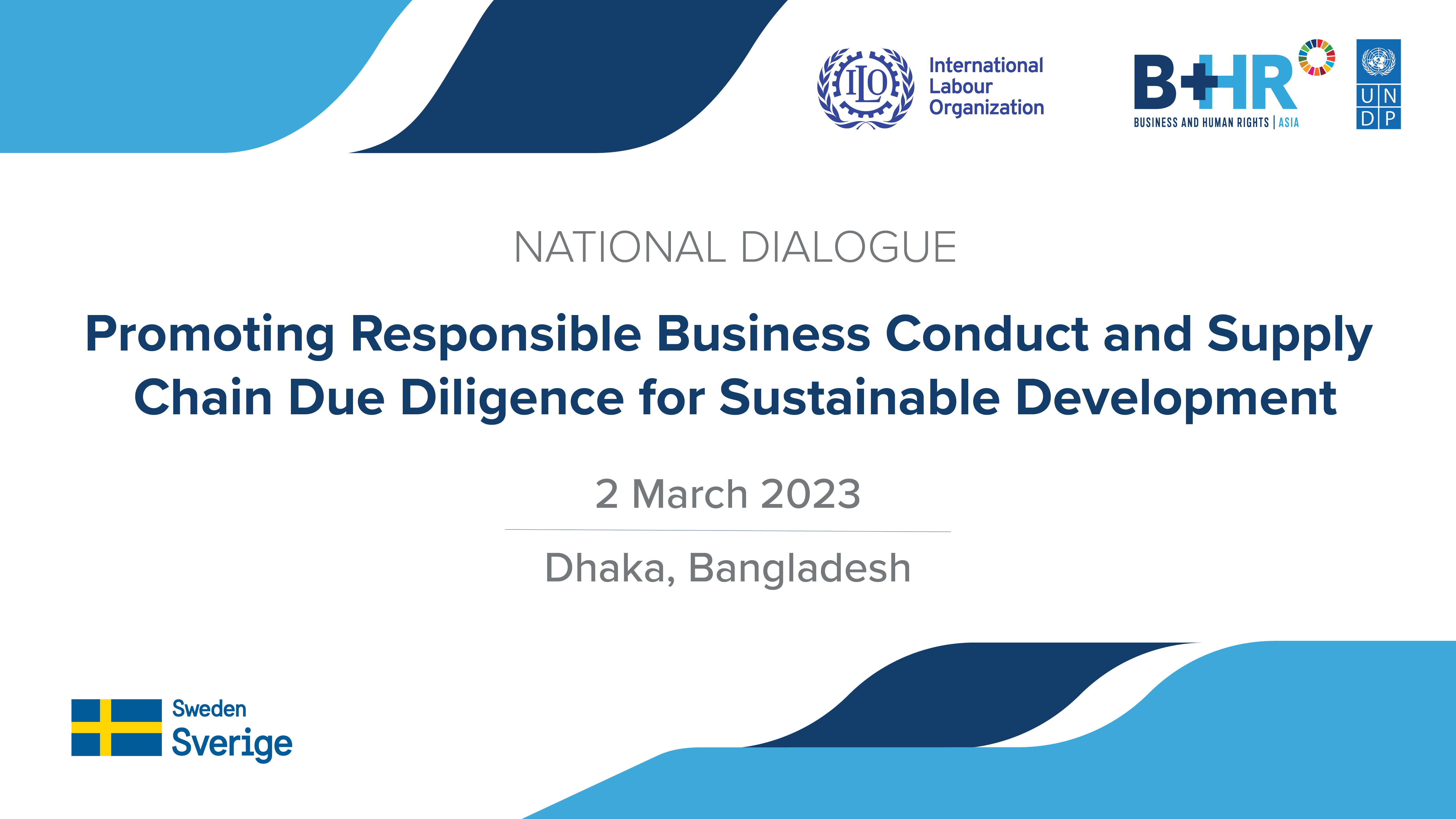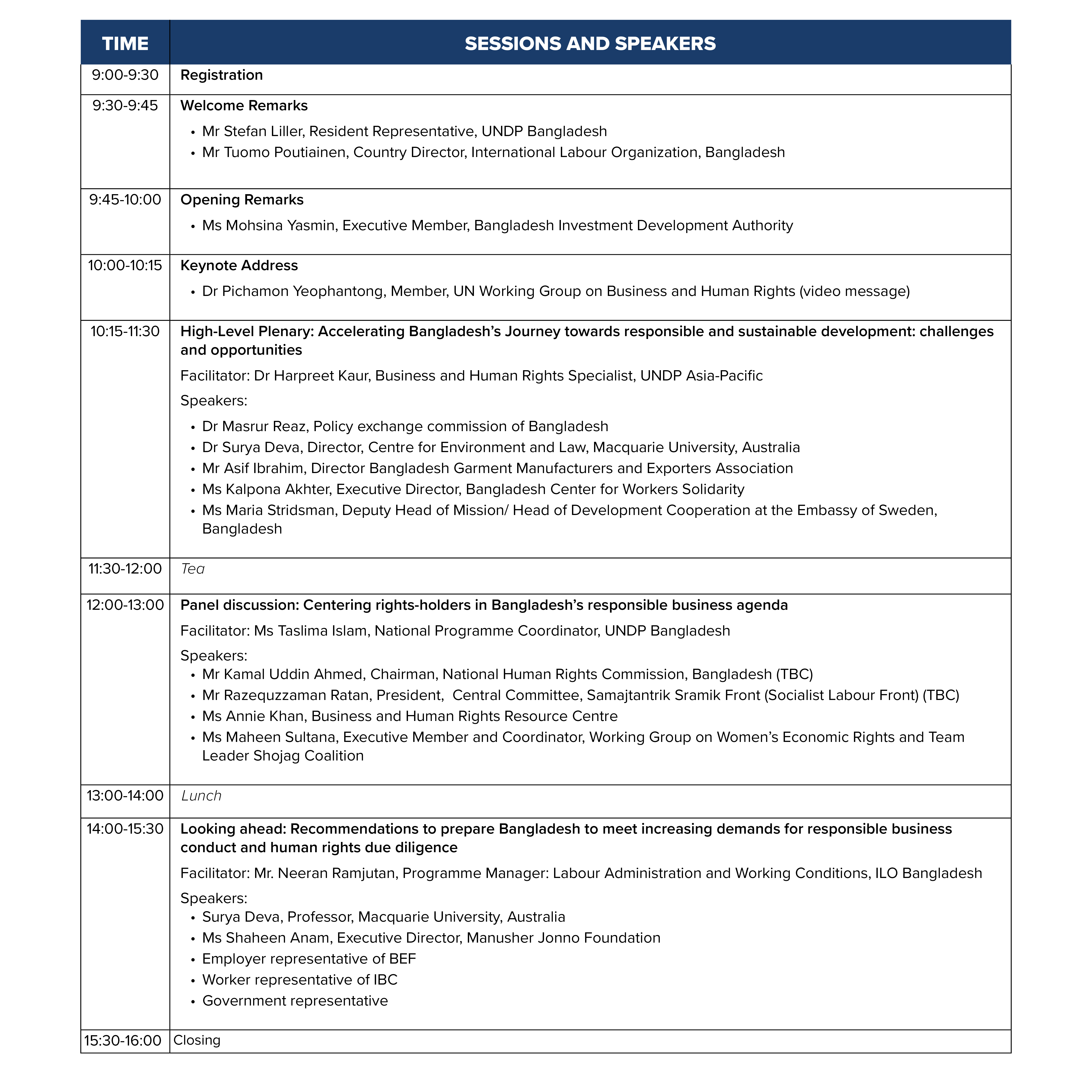National Dialogue: Promoting Responsible Business Conduct for Sustainable Development in Bangladesh
February 14, 2023

Event Details
02 March 2023
0900-1600
Le Méridien Dhaka, Dhaka, Bangladesh
Register for the National Dialogue
VENUE:
Le Méridien Dhaka
79/A Commercial Area, Airport Rd., Nikunja 2, Khilkhet, Dhaka, Bangladesh, 1229
Tel: +880 963-8900089
https://goo.gl/maps/M78dwYHrLCE24Dp29
Background
Bangladesh has placed itself among the world’s emerging economies. The country is due to transition from the Least Developed Countries (LDC) category to a Lower Middle Income Country (LMIC) status in 2026. LDC graduation reflects Bangladesh’s economic strength and resilience to financial and climate shocks, and it highlights the extent of the country’s economic and social progress. Despite the shocks of the COVID-19 pandemic, the country registered a GDP growth rate of 7.2% in 2021-2022 and received $21 billion in remittances. Bangladesh improved its ranking in the Human Development Index (HDI) for 2021-22, and scored 0.719 on the World Economic Forum’s 2021 Global Gender Gap Index, making it one of the top countries in the region for closing the gender gap. It ranks seventh in the index’s sub-ranking of political empowerment and is the only country where more women have held head-of-state positions than men over the past 50 years. Socioeconomic development in Bangladesh opened doors to critical jobs, providing stable employment, some social security measures, and improved social mobility for many. However, despite this progress, Bangladesh continues to face challenges concerning business-related human rights abuses and barriers to accessing effective remedies. Bangladesh is rated as one of the ten worst countries in the world for working people in 2021, according to the ITUC Global Rights Index, where over 35,000 Bangladeshis die at work every year, and 8 million are injured. Unsafe working conditions, low wages, child labour, forced labour, unfair land acquisition, gender inequality, pay gaps and attacks on human rights defenders are some of the key human rights impacts of businesses in the region. The ILO’s Committee of Experts on the Application of Conventions and Recommendations have identified labour issues and provided recommendations on the application of ratified ILO Conventions. Moreover, the benefits of economic development have not been shared equitably, and many groups, including women, children, people with disabilities, and indigenous peoples, continue to disproportionately face the adverse impacts of business activities.
Bangladesh will need to make significant efforts in the coming years to ensure a smooth transition to the post-LDC era. Hard-learned lessons from the COVID-19 pandemic can inform how Bangladesh navigates LDC graduation and ensures that its policies respond to the needs of people and the planet. One of the key measures for the government to continue this path of development would be to create an enabling environment that promotes responsible business conduct (RBC) and a clean and green economy in line with international standards and local circumstances. The Eighth Five Year Plan of the country stipulates that the economic growth of Bangladesh should be fostered and complemented with transparency and accountability, non-discrimination and fairer social inclusion. The country only stands to gain from a human rights compliant and climate-resilient approach to development. It is, therefore, vital to take a closer look at how different actors can collaborate to mitigate adverse impacts on human rights and contribute to achieve the SDGs while graduating from LDC status.
The UN Guiding Principles on Business and Human Rights (UNGPs) provide an authoritative global framework to achieve these goals. Unanimously endorsed by the Human Rights Council in June 2011, the UNGPs have become an authoritative global standard on business respect for human rights. A set of 31 Principles organised under the three Pillars of ‘Protect, Respect and Remedy’, the UNGPs provide guidance to States and companies to prevent, address and remedy human rights abuses committed in business operations.
Many countries in Asia have made tremendous progress in implementing the UNGPs. While Thailand, Pakistan and Japan adopted National Action Plans on Business and Human Rights (NAP) in 2019, 2021 and 2022, respectively, NAP development processes are underway in India, Indonesia, Malaysia, the Maldives, Mongolia, Nepal, and Viet Nam. The UNGPs informing the development of these NAPs have several linkages with international labour standards. In particular, it refers to internationally recognized human rights – understood, at a minimum, as those expressed in the International Bill of Human Rights and the principles concerning fundamental rights set out in the International Labour Organization’s Declaration on Fundamental Principles and Rights at Work. The ILO’s Tripartite Declaration of Principles concerning Multinational Enterprises and Social Policy (MNE Declaration) provides direct guidance to enterprises on social policy and inclusive, responsible and sustainable workplace practices.
At the same time, governments in many European countries, such as France, Germany and the Netherlands, are adopting legislation on human rights due diligence (HRDD). The European Commission published a proposal for a directive on corporate sustainability due diligence, which requires businesses above a certain size to conduct human rights and environmental due diligence to address adverse impacts on human rights, labour rights, the environment and climate issues. Given that three-fourths of Bangladesh’s exports are targeted at European markets, it will likely be required by businesses in the aforementioned countries to demonstrate due diligence measures in their supply chains.
In this context, the United Nations Development Programme (UNDP), in collaboration with the International Labour Organization (ILO), is organizing a National Dialogue in Bangladesh to convene stakeholders in the country to discuss and reflect on persisting challenges and opportunities in promoting responsible business in Bangladesh.
Objectives
The National Dialogue will bring together representatives of governments, civil society, businesses, trade unions, development partners, and other relevant stakeholders to reflect on the progress, pertinent challenges and opportunities relating to responsible business conduct in Bangladesh. In doing so, the discussions will assess the obstacles and drivers that need to be addressed to promote business respect for human rights in the country. Specifically, the National Dialogue aims to:
– Explore linkages between the responsible business agenda, Bangladesh’s graduation from LDC and the 2030 Agenda
– Take stock of the critical challenges, opportunities and progress made in Bangladesh on the responsible business agenda, including in implementing the UNGPs by developing a national action plan and encouraging businesses to conduct human rights due diligence
– Identify roles and entry points for different stakeholders to build an ecosystem that connects different actors and enables them to promote corporate accountability
REGISTRATION
Registration for the event is open for both in person and virtual attendance.
Register for the National Dialogue here


 Locations
Locations